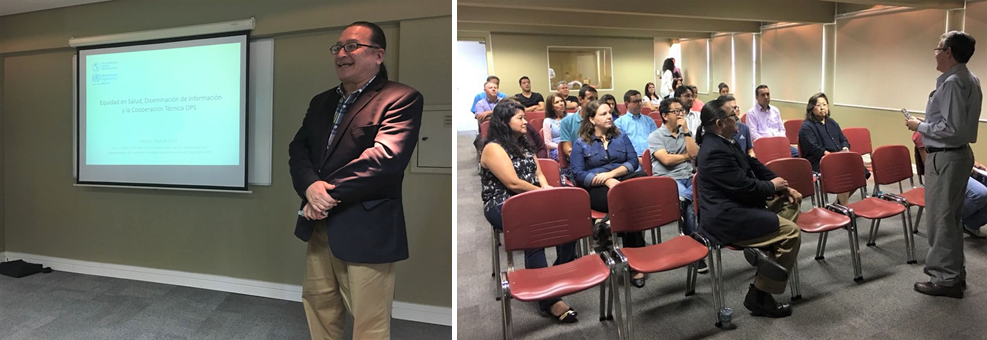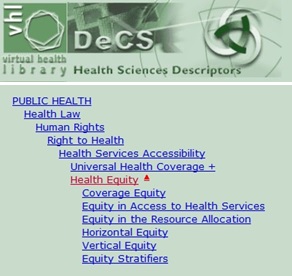Health equity was the topic presented during BIREME’s Café com Ideias (Coffee with Ideas) by Dr. Oscar J Mujica, PAHO/WHO Regional Advisor in Social Epidemiology, Statistics and Health Analysis from the Department of Evidence and Intelligence for Action in Health (EIH). The issue was addressed within the framework of the review that BIREME is conducting in DeCS (Health Sciences Descriptors) related to equity, one of PAHO/WHO cross-cutting issues.
During his presentation, Dr. Mujica shared common ideas on the central position of equity in the work of PAHO/WHO. This key role was illustrated in three aspects:
- As a principle that defines the identity of the institution: equity is a PAHO value (“the struggle for impartiality and justice through the elimination of unnecessary and avoidable differences”) and it is explicit in the Organization’s mission (“to lead collaborative efforts between the Member States in order to promote health equity, fight disease and improve the quality of life of the peoples of the Americas.”);
- As a pillar for institutional planning: equity guides PAHO’s budget politics (as it is the only agency in the United Nations System that incorporated equity as a criteria for defining the progressive distribution of institutional resources) and measures the impact of the goals of its Strategic Plan (PAHO is also the only agency in the United Nations System that considers explicitly specific goals and indicators focused on the reduction of social inequalities in health); and
- As a cross-cutting, priority topic for technical cooperation: health equity is an objective for all of PAHO’s technical cooperation programs, and it is the central element for progressively attaining universality in health (i.e. universal access to health and universal health coverage) and for action in the social determinants of health (i.e., the positive modification of circumstances in which people are born, grow up, live, work and age – and the set of forces and systems that affect such circumstances – in order to guarantee equal opportunities of health and well-being).
 The strengthening of the institutional capacities of Member States and their sub-national levels in order to promote health equity, including the analysis of health situations, distribution and determinants, the monitoring of social inequalities in health, the generation of political incidence (political decision-making and modification of budgetary distribution) for the implementation of population interventions in favor of health equity are therefore priorities for PAHO/WHO’s technical cooperation so as to create and strengthen the ability to account for the commitment and promise of improving the health and well-being of the people of the Americas without leaving anyone behind, which defines the 2030 Agenda for Sustainable Development.
The strengthening of the institutional capacities of Member States and their sub-national levels in order to promote health equity, including the analysis of health situations, distribution and determinants, the monitoring of social inequalities in health, the generation of political incidence (political decision-making and modification of budgetary distribution) for the implementation of population interventions in favor of health equity are therefore priorities for PAHO/WHO’s technical cooperation so as to create and strengthen the ability to account for the commitment and promise of improving the health and well-being of the people of the Americas without leaving anyone behind, which defines the 2030 Agenda for Sustainable Development.
Dr. Mujica also highlighted the essential and direct role of information dissemination for the fulfillment of these noble institutional principles. In this sense, he presented the results of the bibliometric analysis carried out by researchers from the University of Ottawa and Universidade Federal de Uberlândia[1] in order illustrate the observation of a healthy and welcome global trend: an exponential – epidemic – increase in the number of scientific publications focusing on the issue of equity and social inequalities in health published in high-impact indexed journals between 1966 and 2014. Moreover, there is also a larger production and availability of high quality relevant ‘gray’ literature on this subject coming from academic, governmental, non-governmental and private sector institutions. This is clear proof of the growing importance of equity in health and also of the need to act upon the social inequalities in health. In this study, the descriptors used were essentially three: ‘disparity’, ‘inequality’ and ‘inequity’, which adds contemporary relevance to BIREME’s initiative to explore the expansion of the MeSH/DeCS descriptors for the cross-cutting theme equity.
 DeCS is the controlled and trilingual vocabulary used as the sole language for indexing documents from the available sources of the Virtual Health Library, such as the LILACS data base, the largest scientific and technical literature index from Latin America and the Caribbean. Eighty-three percent of the DeCS content comes from the Spanish and Portuguese translation of the MeSH vocabulary, developed by the US National Library of Medicine. The remaining content (17%) is made up of terms gathered in four specific categories in order to contemplate the literature of the Latin America and Caribbean Region. The DeCS goes through annual updates, the so-called versions, which follow the MeSH updates, also made annually.
DeCS is the controlled and trilingual vocabulary used as the sole language for indexing documents from the available sources of the Virtual Health Library, such as the LILACS data base, the largest scientific and technical literature index from Latin America and the Caribbean. Eighty-three percent of the DeCS content comes from the Spanish and Portuguese translation of the MeSH vocabulary, developed by the US National Library of Medicine. The remaining content (17%) is made up of terms gathered in four specific categories in order to contemplate the literature of the Latin America and Caribbean Region. The DeCS goes through annual updates, the so-called versions, which follow the MeSH updates, also made annually.
The alignment of BIREME with PAHO’s activities and programs underscored the need to evaluate the constant terminology in the DeCS on the topics of the transversal axes for sustainable development. The Equity issue has received the technical cooperation of specialist Dr. Oscar Mujica in order to validate the creation of new descriptors suggested by BIREME’s terminology team after carrying out a study of collection and structuring of terms in the exclusive categories of DeCS. Each suggested descriptor is represented in English, Spanish and Portuguese, and it is followed by its definition in all three languages. Some relevant terms such as Horizontal Equity, Vertical Equity, Equity Stratifiers, Social Health Gradient, just to name a few of the 27 proposed concepts, will be added to the vocabulary.
As Ana Cristina Espindola Campos, a Terminology and Health Classification collaborator at BIREME, stated “the expansion of DeCS to cover the thematic areas of PAHO’s cross-cutting issues contributes to increase the specificity of document indexing on the subject, thus favoring its recovery, visibility and circulation among decision makers for public health policies.
According to Dr. Diego González, BIREME Director, “the concept of equity is applied in the products and services of the Center, as we saw in all the work we are doing with DeCS, but also when we carry out projects aimed at those who have greater difficulty at accessing information; such is the case of health personnel who work in distant local areas and who represent a priority on which we are focused”.
[1]Bouchard L, Albertini M, Batista R, de Montigny J. Research on health inequalities: A bibliometric analysis (1966-2014).Soc Sci Med2015;141:100-108.